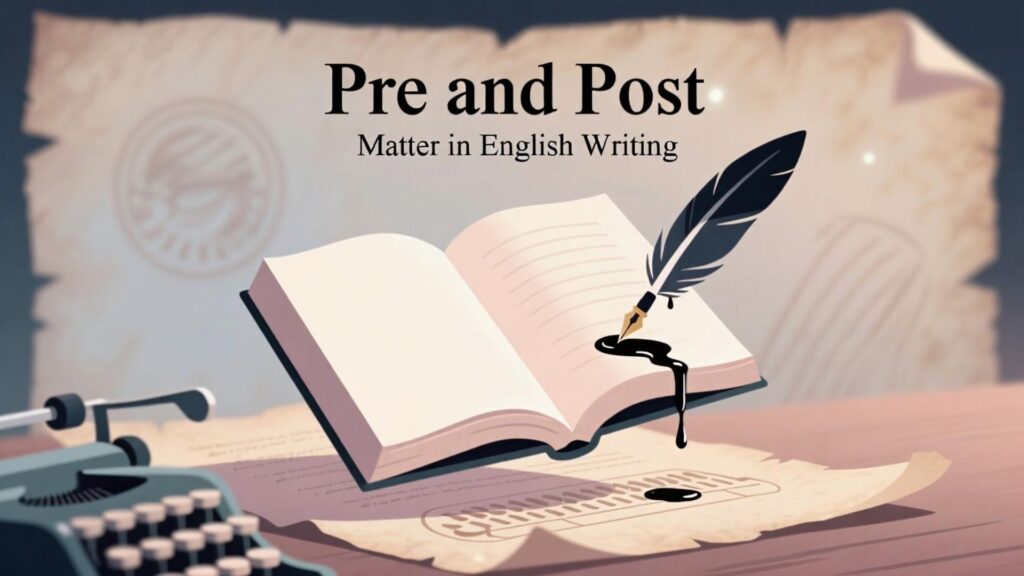When you come across pre and post in English, it’s easy to pause and wonder: Which one should I use? These two prefixes appear everywhere from medical documents to emails yet they trip up even seasoned writers.
The short answer:
- Pre means before.
- Post means after.
That seems simple, but in real writing, it gets trickier. Let’s explore the difference between pre and post, why it matters, and how to use them correctly with examples of pre and post words in sentences, email scenarios, and a quick reference table.
Keyword + Intro Explanation

The prefix definition in English grammar is straightforward: a prefix is a small unit added before a root word to change its meaning. Both pre and post modify words to show time relationships but on opposite ends of the spectrum.
- Pre = before
- Post = after
These two terms come from Latin roots of pre and post and play a big role in showing timeline indicators in sentences.
Simple Definition + Usage Overview
What does Pre mean in English grammar?
The prefix pre signals something that happens before a specific event or action.
Examples:
- Pre-order: Order something before it’s released
- Pre-heat: Heat an oven before cooking
- Pre-interview jitters: Nervousness before an interview
What does Post mean in English grammar?
The prefix post marks something occurring after an event or time.
Examples:
- Postpone: Push something after the planned time
- Post-mortem analysis: An analysis after death or after an event
- Post-workout: What you do after exercise
Clear Rules & Patterns
The choice depends on when the action happens relative to an event.
- Rule 1: If it happens before, use pre.
✅ Pre-launch checklist (before launch) - Rule 2: If it happens after, use post.
✅ Post-event survey (after the event) - Rule 3: Use hyphens for clarity in compound words like pre-meeting or post-surgical care.
Bulleted Rules with Do’s and Don’ts
Do’s:
- ✅ Use pre for planning or preparation (e.g., pre-requisites, pre-enroll).
- ✅ Use post for aftermath or follow-up (e.g., post-game analysis, post-party cleanup).
- ✅ Keep terms consistent in professional documents.
Don’ts:
- ❌ Don’t mix them up; post meaning before or after is always after never before.
- ❌ Don’t omit hyphens in formal writing when using compound forms.
Multiple Example Sentences
Pre Examples
- We need to finish the pre-event checklist by Friday.
- She’s handling all pre-launch activities for the app.
- Please complete the pre-appointment paperwork before arriving.
Post Examples
- The team discussed lessons learned during the post-mortem analysis.
- He’s exhausted after his post-workout session.
- They planned a post-party cleanup to leave the hall spotless.
Scenario Examples (Emails & Real-Life)
Email Example Using Pre-
Subject: Pre-Meeting Notes for Tomorrow
Hi Michael,
Here’s the pre-meeting agenda for tomorrow’s discussion:
- Budget alignment
- Marketing strategy
- Launch timeline
Please review these pre-meeting points so we can start promptly.
Thanks,
Claire
Email Example Using Post-
Subject: Post-Event Follow-Up
Hi Team,
Thanks for your hard work! Here are the post-event action items:
- Send thank-you emails to attendees
- Compile feedback from surveys
- Finalize expense report
Let’s wrap up these post-event tasks by Wednesday.
Regards,
Daniel
Common Mistakes & Fixes
- Mixing up pre and post.
❌ We’ll share a post-event invitation next week.
✔ We’ll share a pre-event invitation next week. - Dropping the hyphen.
❌ Please attend the premeeting call.
✔ Please attend the pre-meeting call.
Quick Reference Table
| Prefix | Meaning | Examples | Usage |
|---|---|---|---|
| Pre- | Before | Pre-order, Pre-heat, Pre-interview jitters | Preparation or planning |
| Post- | After | Postpone, Post-surgical care, Post-game analysis | Follow-up or aftermath |
Why Do Pre and Post Matter in English Writing?

Using the wrong prefix can distort meaning. Imagine saying “Please complete the post-surgical form before your operation.” That’s misleading and could cause confusion.
In business emails, academic writing, and even medical instructions, sentence clarity pre and post matters. It signals whether something is anticipation vs aftermath two very different concepts.
Pre vs Post in Real-Life Contexts
- Prepaid vs Postpaid:
Prepaid means you pay before use, postpaid means you pay after. - Preseason vs Postseason:
In sports, preseason comes before the official games, while postseason happens after the regular season ends.
These terms show how pre and post usage in English influences meaning.
Linguistic Note: Roots and Evolution
Both prefixes trace back to Latin origins:
- Pre- comes from prae meaning before.
- Post- comes from post meaning after.
Their Proto-Indo-European root per- is tied to movement and position, showing how these forms evolved through English word formation and word morphology over centuries.
Wrap-Up
The difference between pre and post is all about time:
- Pre = before an event
- Post = after an event
Whenever you’re unsure, ask: Does this happen before or after the main event? The answer gives you the correct prefix.
✅ Key Takeaways:
- Pre signals preparation (before).
- Post signals follow-up (after).
- Hyphenate for clarity: pre-event, post-event.
Master these, and your writing will always hit the right tone whether you’re talking about a pre-interview pep talk or a post-game analysis.
Bugti is the founder of Quoethint.com, a hub for English language tips, writing advice, and grammar guidance. With years of experience in English studies and a passion for clear communication, Bugti created this platform to make grammar and writing easy to understand for everyone.
